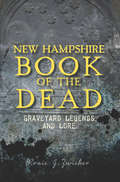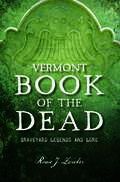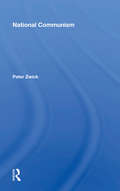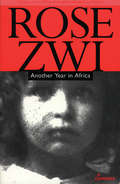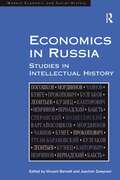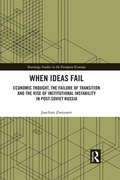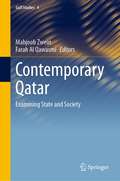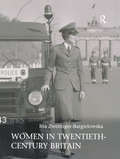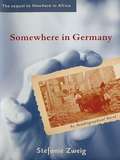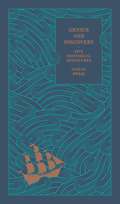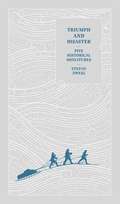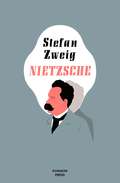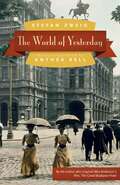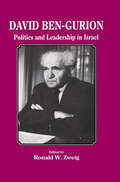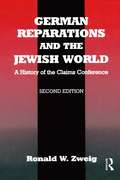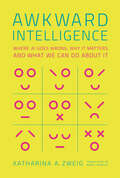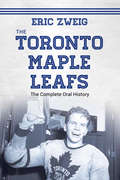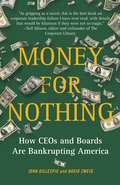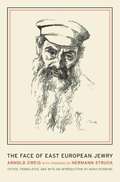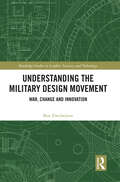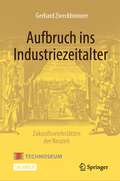- Table View
- List View
New Hampshire Book of the Dead: Graveyard Legends and Lore
by Roxie J. ZwickerA historical journey through the headstones and hauntings of the Granite State—includes photos. New Hampshire&’s historic graveyards, from Portsmouth to North Conway, have bizarre and eerie stories to offer their visitors. Graveyards often invoke fear and superstition among the living, but the dead who rest within them may have more to communicate to the world they left behind. The sands of Pine Grove Cemetery in Hampton once concealed the tombstone of Susanna Smith, but now its message—which reads simply &“Slaine with thunder&”—and her story have risen from beneath the soil. The Point of Graves Cemetery in Portsmouth is home to the spirit of Elizabeth Pierce, who beckons departing guests back to her grave. Along the state&’s southern border in Jaffrey, tombstones at Philips-Heil Cemetery caution the living to cherish life. Here, Roxie Zwicker tours the Granite State&’s oldest burial grounds, exploring the stones, stories, and folklore of these hallowed places.
Vermont Book of the Dead: Graveyard Legends and Lore (The History Press)
by Roxie J. ZwickerVermont's hills hold the echoes of a spirited past. Haunting stories and wandering ghosts are found in numerous burial places from the Riverside Cemetery in Burlington to the Green Mount Cemetery in Montpelier. The Bowman mausoleum in Cuttingsville contains some heartbreaking symbolism. Throughout the state, disturbing tales of mountain madness, murder and "vampires" can be found carved in stone. Discover the graves of humble farmers with independent spirit like Justin Morgan, Ethan Allen, and "Snowflake" Bentley who changed the course of history. The ancient gravestones in Rockingham were once removed and put on exhibit in New York City, while innovative gravestone carvers from Barre to Bennington left artistic interpretations of death to awe and inspire. Author and tour guide Roxie Zwicker explores these historic and legendary graveyards.
National Communism
by Peter ZwickAccording to the generally accepted view that nationalism is alien to communism and that internationalism disallows divisions based on nations, the existence of national communism is often interpreted as a sign of the breakup of the world communist movement. This book reexamines the evidence on the role of nations and national variations, beginning with Marx and moving through Leninism and Stalinism to Titoism, Maoism, Castroism, and current national liberation movements (e.g., in Nicaragua). Professor Zwick concludes that nationalism has always been an inherent element of communism. He demonstrates with numerous concrete cases that, rather than signaling the decline of communism, national adaptation is the source of its strength. The limits of national variation as defined by the Brezhnev Doctrine are precisely defined and examined in the cases of Hungary, Czechoslovakia, and Poland. The book bridges the gap between Marxist theory and communist practice with respect to the central role that nationalism will continue to play in the contemporary world. No other study presents this material in a cross-national, comparative perspective.
Another Year in Africa
by Rose ZwiThey came from the stetl to a new land, to a new life. Another year in Africa, they said, another year in exile. The old world of pogroms is challenged by their new lives in Africa and the child Ruth is haunted by memories of tragedy and persecution that are not even hers.
Economics in Russia: Studies in Intellectual History (Modern Economic And Social History Ser.)
by Joachim ZweynertThe history of Russian economic ideas from the sixteenth century to contemporary times is a fascinating, tumultuous yet neglected topic among Western scholars. Whilst over the last 15 years increasing amounts of work has been done on the subject, co-operation between Russian and Western researchers in this field leaves much to be desired. In order to improve this situation, this volume unites Russian and non-Russian researchers together to provide an overview of the current state of the topic and to give a stimulus for further research. Bringing together scholars from the UK, Germany, Japan, Australia, Finland and Russia, the collection puts forward differing, yet complimentary, perspectives on the long-term history of Russian economic ideas. Offering a broad collection of articles covering the period from the seventeenth to the twentieth centuries, authors have approached the subject from diverse theoretical angles. Contributions in the tradition of Blaug and Schumpeter focusing on economic analysis in a narrower sense, and contributions that - in line with authors like Pribram or Perlman/McCann - deal with economic thought in the context of history and culture, are all represented. In terms of content, the editors have encouraged approaches that represent different economic traditions in order to encourage a diversity of opinions on the national development of Russian economics. As such the volume offers a broad and very relevant assessment of the subject for both historians and economists alike.
When Ideas Fail: Economic Thought, the Failure of Transition and the Rise of Institutional Instability in Post-Soviet Russia (Routledge Studies in the European Economy)
by Joachim ZweynertIn the history of Russian economic ideas, a peculiar mix of anthropocentrism and holism provided fertile breeding ground for patterns of thought that were in potential conflict with the market. These patterns, did not render the emergence of capitalism in Russia impossible. But they entailed a deep intellectual division between adherents and opponents of Russia’s capitalist transformation that made Russia’s social evolution unstable and vulnerable to external shocks. This study offers an ideational explanation of Russia’s relative failure to establish a functioning market economy and thus sets up a new and original perspective for discussion. In post-Soviet Russia, a clash between imported foreground ideas and deep domestic background ideas has led to an ideational division among the elite of the country. Within economic science, this led to the emergence of two thought collectives, (in the sense of Ludvik Fleck), with entirely different understandings of social reality. This ideational division translated into incoherent policy measures, the emergence of institutional hybrids and thus, all in all, into institutional instability. Empirically, the book is based on a systematic, qualitative analysis of the writings of Soviet/Russian economists between 1987 and 2012. This groundbreaking book makes an important contribution to Central Eastern and Eastern European area studies and to the current debate on ideas and institutions in the social sciences.
Contemporary Qatar: Examining State and Society (Gulf Studies #4)
by Mahjoob Zweiri Farah Al QawasmiThis book addresses critical topics and unanswered questions on the contemporary state of Qatar. Drawing together a unique combination of authors that have researched the Gulf Cooperation Council (GCC) in general, and the state of Qatar specifically, each author provides an in-depth empirical analysis of Qatar’s current social, political, and economic landscape against a historically informed backdrop. Cognizant of its rapid state of flux, the contributors collectively provide a comprehensive overview of the intersection of these respective areas, delving into the historical creation of Qatar as a state, its politics and systems of governance, its economic strata and reliance on natural resources, its society and national identity, its new and thriving sports culture, and, most topically, matters of diplomacy, the 2017 blockade, and its armed forces. Owing to the contributors’ invaluable firsthand experience and knowledge of Qatar, this book provides valuable insights into this nation, at once old and new, and its intertwined trajectories in its socio-political and economic positionality within the region. This book is an invaluable resource for students and scholars researching the Middle East generally, and the Gulf, specifically, with interests in topics such as politics and international relations, political economy and foreign policy, development, sources of social change, societal activism, popular culture, and the various elements of identity.
Women in Twentieth-Century Britain: Social, Cultural and Political Change
by Ina Zweiniger-BargielowskaWomen's lives have changed dramatically over the course of the twentieth century: reduced fertility and the removal of formal barriers to their participation in education, work and public life are just some examples. At the same time, women are under-represented in many areas, are paid significantly less than men, continue to experience domestic violence and to bear the larger part of the burden in the domestic division of labour. Women in 2000 may have many more choices and opportunities than they had a hundred years ago, but genuine equality between men and women remains elusive. This unique, illustrated history discusses a wide range of topics organised into four parts: the life course - the experience of girlhood, marriage and the ageing process; the nature of women's work, both paid and unpaid; consumption, culture and transgression; and citizenship and the state.
Somewhere in Germany
by Stefanie ZweigSomewhere in Germany is the sequel to the acclaimed Nowhere in Africa, which was turned into the Oscar-winning film of the same name. This novel traces the return of the Redlich family to Germany after their nine-year exile in Kenya during World War II. In Africa, Walter had longed for his homeland and dreamed of rebuilding his life as a lawyer, yet ultimately he and his family—wife Jettel, daughter Regina, and baby Max—realize that Germany seems as exotic and unwelcoming to them in 1947 as Kenya had seemed in 1938. Hunger and desperation are omnipresent in bombed-out Frankfurt, and this Jewish family—especially Regina, who misses Africa the most—has a hard time adjusting to their new circumstances. Yet slowly the family adapts to their new home amidst the ruins In Frankfurt, Regina matures into a woman and, though her parents want her to marry an upstanding Jewish man, her love life progresses in its own idiosyncratic fashion. She develops a passion for art and journalism and begins her professional career at a Frankfurt newspaper. Walter at last finds professional success as a lawyer, but never quite adjusts to life in Frankfurt, recalling with nostalgia his childhood in Upper Silesia and his years in Africa. Only his son Max truly finds what Walter had hoped for: a new homeland in Germany Although the Redlichs receive kindness from strangers, they also learn anti-Semitism still prevails in post-Nazi Germany. They partake in the West German “economic miracle” with their own home, a second-hand car, and the discovery of television, but young Max’s discovery of the Holocaust revives long-buried memories. Rich in memorable moments and characters, this novel portrays the reality of postwar German society in vivid and candid detail.
Genius and Discovery: Five Historical Miniatures
by Stefan Zweig Anthea BellOne of two beautifully designed hardback gift editions of Stefan Zweig's breathlessly dramatic historical sketches, out in time for the holidays.Millions of people in a nation are necessary for a single genius to arise, millions of tedious hours must pass before a truly historic shooting star of humanity appears in the sky.Five vivid dramatizations of some of the most pivotal episodes in human history, from the Discovery of the Pacific to the composition of the Marseillaise, bringing the past to life in brilliant technicolor.Included in this collection:"Flight into Immortality": Vasco Núñez de Balboa's quest to be the first European to see the Pacific Ocean. "The Resurrection of George Frederic Handel": Handel falls into depression until a poet sends him an inspirational work."The Genius of a Night": Captain Rouget writes La Marseillaise, the song which is to become the French national anthem."The Discovery of El Dorado": John Sutter founds New Helvetia in western America and attempts to keep it."The First Word to Cross the Ocean": Cyrus W. Field resolves to lay the first trans-Atlantic telegraph cable.
Triumph and Disaster: Five Historical Miniatures
by Stefan Zweig Anthea BellOne of two beautifully designed hardback gift editions of Stefan Zweig's breathlessly dramatic historical sketches, out in time for Christmas.A single Yes, a single No, a Too Soon or a Too Late makes that hour irrevocable for hundreds of generations while deciding the life of a single man or woman, of a nation, even the destiny of all humanity.Five vivid dramatizations of some of the most pivotal episodes in human history, from the Fall of Constantinople to Scott's doomed attempt to reach the South Pole, bringing the past to life in brilliant technicolor.Included in this collection:"The Field of Waterloo": A fascinating little known story of Napoleon's defeat."The Race to Reach the South Pole": The failed expedition of the English to discover the South Pole first."The Conquest of Byzantium": Sultan Mahomet's defeat of Byzantium through a neglected door."The Sealed Train": Lenin's triumphant return from exile."Wilson's Failure": The Treaty of Versailles is signed.
Encounters and Destinies: A Farewell to Europe
by Stefan ZweigA new collection of essays by Stefan Zweig: tributes to the great artists and thinkers of the Europe of his dayStefan Zweig was one of the twentieth century's greatest authors and a tireless champion of freedom, tolerance and friendship across borders. Encounters and Destinies collects his most impassioned and moving tributes to his many illustrious friends and peers: literary, philosophical and artistic luminaries from across the Old Europe that Zweig loved so much, and which he grieved to see so cruelly destroyed by two world wars.Including pieces on Rainer Maria Rilke, Marcel Proust, Sigmund Freud, Maxim Gorky and Arturo Toscanini, this essential collection is also Zweig's tribute to the ideal of friendship: an ideal he clung to as the world he knew was torn apart.
Nietzsche: The Struggle With The Daemon (Master Builders Of The Spirit Ser.)
by Stefan ZweigA scintillating biographical study of the one of the greatest philosophers of the nineteenth century, by one of the bestselling writers of the twentieth.In this vivid biography, Zweig eschews traditional academic discussion and focuses on Nietzsche's habits, passions and obsessions. This work, concentrating on the man rather than the work, on the tragedy of his existence and his apartness from the world in which he moved in enforced isolation, is a tour de force, drawing the reader inexorably into Nietzsche's tragic trajectory.Illustrated with numerous photographs relating to Nietzsche and his European locations, this superb translation by Will Stone is essential reading for anyone interested in Nietzsche, Zweig, first-class biographies and philosophy.
Shooting Stars: Ten Historical Miniatures
by Stefan ZweigTen turning points in history, vividly sketched by the great Stefan Zweig "Such dramatically concentrated, such fateful hours, in which a timeless decision hangs on a single date, a single hour, even just a single minute, rarely occur in everyday life, and only rarely in the course of history. " One of the twentieth century's great humanists and a hugely popular fiction writer, Stefan Zweig's historical works bring the past to life in brilliant Technicolor. This collection contains ten typically breathless and erudite dramatizations of some of the most pivotal episodes in human history. From General Grouchy's failure to intervene at Waterloo, to the miraculous resurrection of George Frideric Handel, this, Stefan Zweig's selection of historical turning points, newly translated by Anthea Bell, is idiosyncratic, fascinating and as always hugely readable.
The World of Yesterday
by Stefan ZweigThis book recalls the golden age of literary Vienna―its seeming permanence, its promise, and its devastating fall. <p><p> Surrounded by the leading literary lights of the epoch, Stefan Zweig draws a vivid and intimate account of his life and travels through Vienna, Paris, Berlin, and London, touching on the very heart of European culture. His passionate, evocative prose paints a stunning portrait of an era that danced brilliantly on the edge of extinction. This new translation by award-winning Anthea Bell captures the spirit of Zweig’s writing in arguably his most revealing work.
David Ben-Gurion: Politics and Leadership in Israel
by Ronald W ZweigFirst published in 2004. It may well be that genius begins where fear ends: not to be afraid to question what is known, not to be afraid to be original. David Ben-Gurion did not try to imitate anyone...He was endowed with a mind that sought out whats was new and was capable of penetrating the deepest recesses. First and foremost, he challenged every Jew who believed it was the fate of Jews to live in the Diaspora, and he believed that the Jews could be a nation of farmers, industrialists, soldiers, pioneers, and not only scientists and intellectuals. He decided that the time had come to establish a Jewish state, yet once it had been founded, he was not satisfied- it must be an exemplary state, a chosen state.
German Reparations and the Jewish World: A History of the Claims Conference
by Ronald W. ZweigGerman Reparations and the Jewish World" has become a standard reference work since it was first published. Based extensively on archival sources, the author examines the difficult debate within the Jewish world whether it was possible to reach a material settlement with Germany so soon after Auschwitz. Concentrating on how the money was spent in rebuilding Jewish life, he also analyzes how the reparations payments transformed the relations bteween Israel and the diaspora, and between different Jewish political and ideological groups. This revised and expanded edition includes material on sensitive relief programmes from archives that have only recently been opened to researchers. In a new, extensive introductory essay the author reexamines the reparations, restitution and indemnification processes from the perspective of 50 years later.
Awkward Intelligence: Where AI Goes Wrong, Why It Matters, and What We Can Do about It
by Katharina A. ZweigAn expert offers a guide to where we should use artificial intelligence—and where we should not.Before we know it, artificial intelligence (AI) will work its way into every corner of our lives, making decisions about, with, and for us. Is this a good thing? There&’s a tendency to think that machines can be more &“objective&” than humans—can make better decisions about job applicants, for example, or risk assessments. In Awkward Intelligence, AI expert Katharina Zweig offers readers the inside story, explaining how many levers computer and data scientists must pull for AI&’s supposedly objective decision making. She presents the good and the bad: AI is good at processing vast quantities of data that humans cannot—but it&’s bad at making judgments about people. AI is accurate at sifting through billions of websites to offer up the best results for our search queries and it has beaten reigning champions in games of chess and Go. But, drawing on her own research, Zweig shows how inaccurate AI is, for example, at predicting whether someone with a previous conviction will become a repeat offender. It&’s no better than simple guesswork, and yet it&’s used to determine people&’s futures. Zweig introduces readers to the basics of AI and presents a toolkit for designing AI systems. She explains algorithms, big data, and computer intelligence, and how they relate to one another. Finally, she explores the ethics of AI and how we can shape the process. With Awkward Intelligence. Zweig equips us to confront the biggest question concerning AI: where we should use it—and where we should not.
Fever Season
by Eric ZweigEric Zweig is a managing editor with Dan Diamond & Associates, consulting publishers to the National Hockey League. He has written about sports and sports history for many major publications, including the Toronto Star and the Globe and Mail His non-fiction sports books for young people include Star Power: The Legend and Lore of Cyclone Taylor and Crazy Canucks. He lives in Owen Sound, Ontario.
The Toronto Maple Leafs: The Complete Oral History
by Eric ZweigA complete history of the Toronto Maple Leafs, as told by the players, coaches, and reporters. On December 19, 1917, the Toronto Arenas took to the ice for the first NHL game ever played. Over the next hundred years, the franchise changed names twice, home rinks twice, and won 13 Stanley Cups on its way to becoming one of the most successful and storied franchises in NHL history. The Toronto Maple Leafs: The Complete Oral History gives the most comprehensive record of the team from its formation to the present day. With first-hand accounts of some of the biggest names ever to play the game — Syl Apps, Darryl Sittler, Mats Sundin — as well as coaches, managers, and commentators, Eric Zweig gives readers the full insider history of Canada’s most iconic team.
Twenty Greatest Hockey Goals
by Eric ZweigEvery hockey fan remembers certain goals scored that stand out from all others. But if one had to name just 20 as the greatest ever accomplished, what would they be? There’s Paul Henderson’s third game-winning goal in 1972, the one that clinched the Summit Series for Canada against the Soviet Union. Also Mike Eruzione’s upset "Miracle on Ice" winner for the United States against the Soviets at Lake Placid in 1980. And don’t forget the famous Stanley Cup winners by the Toronto Maple Leafs’ Bill Barilko in 1951 and the Boston Bruins’ Bobby Orr in 1970. From the goal by the Montreal Victorias against the Winnipeg Victorias in the 1896 Stanley Cup rematch that truly made hockey’s most famous hardware a national event, to Wayne Gretzky’s 77th goal in 1982 that beat Phil Esposito’s single-season record for goals, to Sidney Crosby’s "golden goal" in the 2010 Vancouver Winter Olympics, Zweig serves up a slice of exceptional hockey moments that’s sure to provoke heated discussion.
Money for Nothing: How the Failure of Corporate Boards Is Ruining American Business and Costing Us Trillions
by David Zweig John GillespieA Bank of America director questioned the CEO's $76 million pay package in a year when the bank was laying off 12,600 workers and found herself dropped from the board without notice a few months later. According to their employment agreements -- approved by boards -- 96 percent of large company CEOs have guarantees that do not allow them to be fired "for cause" for unsatisfactory performance, which means they can walk away with huge payouts, and 49 percent cannot be fired even for breaking the law by failing in their fiduciary duties to shareholders. The General Motors board gave CEO Rick Wagoner a 64 percent pay raise -- to $15.7 million -- in 2007, when the company lost $38.7 billion. The company went bankrupt two years later at a cost of $52 billion to shareholders and another $13.4 billion to all taxpayers. If you own stock -- and 57 million U.S. households do -- every cent of these outrages comes out of your pocket, thanks to boards of directors who are supposed to represent your interests. Every customer, employee, and taxpayer is also being hurt and American business is being imperiled. In the most recent economic collapse, almost all attention has focused on the greed, recklessness, or incompetence of CEOs rather than the negligence of boards, who ought to be held equally, if not more, accountable because the CEOs theoretically work for them. But the world of boards has become an entrenched insiders' club -- virtually free of accountability or personal liability. Too often, corporate boards act as enabling lapdogs rather than trustworthy watchdogs, costing us trillions. Money for Nothing exposes the glaring flaws in this dysfunctional system, including directors who are selected by the CEOs they are meant to hold accountable; compensation consultants who legitimize outrageous pay; accountants and attorneys who see no evil; legal vote buying; rampant conflicts of interest; and much more. Using their extensive original reporting and interviews with high-level insiders, John Gillespie and David Zweig -- both Harvard MBAs with thirty-plus years of Fortune 100 experience at investment banks and media companies -- expose what happened, or failed to happen, in the boardrooms of companies such as Lehman Brothers, General Motors, Bear Stearns, and Countrywide and how it has resulted in so much financial devastation. They reveal how the byzantine yet indestructible web of power and money has brought on collapse after collapse, with fig-leaf reforms that feebly anticipate last year's scandal, but never next year's. Money for Nothing shows how the game is played, and how you can help to demand real change in a badly broken system.
The Face of Eastern European Jewry
by Arnold ZweigThis work brings together the impassioned writing of one of Weimar Germany's most celebrated authors, Arnold Zweig, and the equally poignant illustrations by renowned graphic artist and lithographer Hermann Struck.
Understanding the Military Design Movement: War, Change and Innovation (Routledge Studies in Conflict, Security and Technology)
by Ben ZweibelsonThis book explains the history and development of the military design movement, featuring case studies from key modern militaries. Written by a practitioner, the work shows how modern militaries think and arrange actions in time and space for security affairs, and why designers are disrupting, challenging, and reconceptualizing everything previously upheld as sacred on the battlefield. It is the first book to thoroughly explain what military design is, where it came from, and how it works at deep, philosophically grounded levels, and why it is potentially the most controversial development in generations of war fighters. The work explains the tangled origins of commercial design and that of designing modern warfare, the rise of various design movements, and how today’s military forces largely hold to a Newtonian stylization built upon mimicry of natural science infused with earlier medieval and religious inspirations. Why does our species conceptualize war as such, and how do military institutions erect barriers that become so powerful that efforts to design further innovation require entirely novel constructs outside the orthodoxy? The book explains design stories from the Israel Defense Force, the US Army, the US Marine Corps, the Canadian Armed Forces, and the Australian Defence Force for the first time, and includes the theory, doctrine, organizational culture, and key actors involved. Ultimately, this book is about how small communities of practice are challenging the foundations of modern defence thinking. This book will be of much interest to students of military and strategic studies, defence studies, and security studies, as well as design educators and military professionals.
Aufbruch ins Industriezeitalter – Zukunftswerkstätten der Neuzeit
by Gerhard ZweckbronnerWir leben in einer von Technik geprägten Welt. Dieses Sachbuch möchte ein Grundverständnis für technische Funktionsweisen und Zusammenhänge vermitteln. Es zeigt historische Entwicklungswege bis in die Gegenwart auf und macht deutlich, vor welche Entscheidungen wir heute gestellt sind. Wer sich in unserer hochtechnisierten Welt besser orientieren möchte, dem könnte ein Blick in die Zukunftswerkstätten der Vergangenheit helfen: jener Zeiten des Aufbruchs, in denen, ausgehend vom europäischen Kulturkreis, die mentalen und wissenschaftlich-technischen Grundlagen unserer modernen Lebenswelt geschaffen wurden. Kühne Fortschrittserwartungen, weit ausgreifende Visionen, aber auch warnende Stimmen begleiten die Entwicklung bis zum heutigen Tag.
